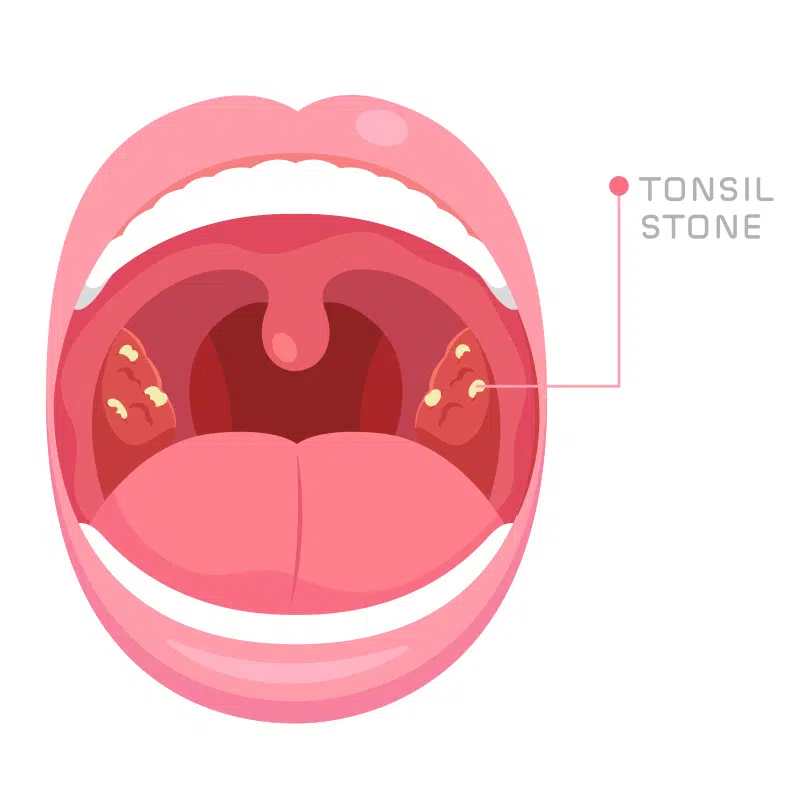
Tonsil and Adenoid Surgery
At Becker ENT & Allergy, our highly trained team of pediatric specialists is dedicated to providing top-quality ear, nose, and throat care for children. We understand that issues with the tonsils and adenoids can affect your child’s breathing, sleep quality, and overall well-being. Through compassionate care, detailed evaluations, and state-of-the-art surgical techniques, our goal is to help your child achieve the best possible outcome and return to normal activities as quickly as possible.
Tonsil and adenoid surgery (tonsillectomy, tonsillotomy, and/or adenoidectomy) are among the most commonly performed pediatric surgeries. When conservative treatments are no longer effective, removing the tonsils and/or adenoids can bring relief from chronic infections, breathing obstructions, and other complications. We invite you to learn more about these procedures, what to expect before and after surgery, and why choosing an experienced ENT specialist at Becker ENT & Allergy can make all the difference in your child’s care.
What Are Tonsils and Adenoids?
Tonsils and adenoids are small structures composed of lymphoid tissue that help the body fight infection. They are part of the immune system and are located in the nasal and oral airways. The tonsils sit on either side at the back of the mouth, while the adenoids are found higher up, behind the nose. In children, tonsils and adenoids often play a bigger role in fighting off germs because children’s immune systems are still developing.
Sometimes, however, tonsils and adenoids can become chronically inflamed or enlarged. They may contribute to breathing difficulties, cause recurrent infections, or lead to complications like sleep disordered breathing and sleep apnea. When these issues become persistent and affect a child’s quality of life, an ENT specialist may recommend a surgical procedure such as a tonsillectomy, tonsillotomy, or adenoidectomy.
Reasons for Tonsil and Adenoid Surgery

Tonsil and adenoid surgery is often recommended for children who experience frequent infections, breathing problems, or significant discomfort. While they are part of the immune system, enlarged or chronically inflamed tonsils and adenoids can sometimes do more harm than good. Surgery may alleviate issues like difficulty swallowing, frequent sore throats, and snoring that disrupts sleep.
Below are some of the most common reasons why surgery may be suggested for your child:
- Recurrent Tonsillitis
- Chronic Tonsillar Hypertrophy (Enlarged Tonsils)
- Adenoid Hypertrophy
- Obstructive Sleep Apnea
- Chronic Ear Infections or Fluid Buildup
- Difficulty Swallowing or Eating
- Persistent Snoring or Mouth Breathing
Symptoms of Enlarged or Inflamed Tonsils and Adenoids
Enlarged or inflamed tonsils and adenoids can present a variety of symptoms. Many parents first notice issues with their child’s breathing, especially at night. Some children may also have ongoing throat pain or repeated ear problems that do not respond to standard treatments. Recognizing these symptoms early can help ensure your child receives a timely evaluation.
Below are some of the most common symptoms associated with enlarged or inflamed tonsils and adenoids:
- Chronic Sore Throat and Tonsillitis
- Frequent Ear Infections or Ear Fluid
- Breathing Through the Mouth Instead of the Nose
- Loud Snoring or Disrupted Sleep
- Recurring Nasal Congestion
- Difficulty Swallowing
- Bad Breath (Halitosis)

Risk Factors for Developing Enlarged or Inflamed Tonsils and Adenoids
Certain children may be more prone to tonsil and adenoid problems due to environmental factors, exposure to germs, or genetic predispositions. Understanding these risk factors can help parents be more vigilant about their children’s symptoms and more proactive in seeking medical advice. While not every child with these risk factors will develop problems, awareness can help with early detection.
Below are common risk factors for developing enlarged or inflamed tonsils and adenoids:
Frequent Exposure to Viruses and Bacteria
Children in daycare or school often experience repeat infections.
Family History of Tonsil or Adenoid Issues
A genetic predisposition may make some children more likely to develop problems.
Environmental Allergens
Chronic exposure to allergens such as pollen, dust, or pet dander can contribute to inflammation.
Recurrent or Persistent Ear Infections
Ongoing issues in the ear may be associated with enlarged adenoids.

Consultation and Diagnosis for Tonsil and Adenoid Surgery
A consultation for tonsil and adenoid surgery typically begins with a thorough review of your child’s medical history. Our pediatric ENT specialists at Becker ENT & Allergy will ask about your child’s symptoms, frequency of infections, sleep quality, breathing difficulties, and any treatments your child has already tried. This may include a record of antibiotic use, history of missed school days, or concerns about growth and development.
During the visit, your child’s doctor will perform a physical examination of the throat, nose, and ears. A nasal endoscopy may be performed to evaluate the adenoids. In some cases, imaging tests or a sleep study may be recommended to further evaluate any obstruction of the airway or to detect sleep apnea. Using this comprehensive approach, our specialists will determine whether your child is a good candidate for tonsil or adenoid surgery or whether further conservative treatments should be explored first.

How Tonsil and Adenoid Surgery Is Performed
Tonsil and adenoid surgery can be done in one of several ways. The most common procedures are a full tonsillectomy (removal of the entire tonsil), a tonsillotomy (partial removal of the tonsils), and an adenoidectomy (removal of the adenoids). These procedures are usually performed under general anesthesia, ensuring that your child is comfortable and does not feel pain during surgery. Most pediatric tonsil and adenoid surgeries are done on an outpatient basis, meaning your child will likely go home the same day.
- A pediatric anesthesiologist or anesthesia provider will administer medication to help your child sleep through the procedure.
- An endotracheal tube will be inserted to protect and to control breathing. Your child’s vital signs will be monitored throughout the surgery.
Anesthesia Administration
- A special device is used to remove or reduce the tonsil tissue.
- Techniques may vary: some surgeons use electrocautery (heat), cold steel instruments, or other methods to minimize bleeding.
Tonsillectomy or Tonsillotomy
- If the adenoids are removed, the surgeon accesses the area typically through the mouth to remove the excess tissue at the back of the nasal passage.
- This typically takes only a few minutes and may be done using suction cautery or other specialized instruments.
Adenoidectomy
- The surgical site is carefully monitored to ensure that bleeding is controlled before the procedure is completed.
Bleeding Control
- Your child will be taken to a recovery area, where trained nurses will monitor vital signs and ensure that your child is waking safely from anesthesia.
- Pain management and hydration are key priorities at this stage.
Recovery Room
Alternatives to Tonsil and Adenoid Surgery
While tonsillectomy, tonsillotomy, and adenoidectomy can be highly effective, surgery is not always the first step. In many cases, children may benefit from other treatments, especially if their symptoms are not severe or life-altering. Your Becker ENT & Allergy specialist will work with you to discuss possible non-surgical approaches before recommending surgery.
Below are some common alternatives or conservative treatments to consider:
Antibiotic Therapy
Infections can sometimes be controlled with appropriate antibiotics, especially if they are bacterial in nature.
Nasal Steroid Sprays or Allergy Medications
Treating underlying allergies and inflammation can reduce the size of the adenoids and improve breathing.
Saline Nasal Rinses
Rinsing out the nasal passages can help reduce congestion and remove irritants that may contribute to adenoid swelling.
Watchful Waiting
Some children outgrow frequent infections as their immune systems mature. Monitoring symptoms over time may be sufficient if they are not too severe.
Speech Therapy or Myofunctional Therapy
In select cases, addressing swallowing or speech issues with therapy can help reduce strain on the throat area.
Preparing for Tonsil and Adenoid Surgery
Preparation for tonsil and adenoid surgery is an important step in ensuring a smooth experience and a quicker recovery. When you schedule the procedure at Becker ENT & Allergy, our team will provide specific instructions tailored to your child’s needs. This often includes guidelines on food and drink intake before surgery, medication use, and ways to help your child feel more relaxed about the procedure.
Below are key points to consider when preparing for surgery:
- Your child may need blood tests or other evaluations to ensure they are healthy enough for surgery, learn about any bleeding disorders, etc.
- Discuss any medications or supplements your child is taking with the doctor.
Pre-Operative Evaluation
- Your child will need to stop eating and drinking for a certain period before anesthesia.
- Strictly follow these instructions to avoid complications with anesthesia.
Fasting Guidelines
- Talk to your child about what to expect in simple, reassuring terms.
- Bring a favorite toy or blanket to help your child feel at ease.
Comfort and Reassurance
- Plan for a responsible adult to drive your child home after the procedure.
- Arrange for some help at home if you have other children or responsibilities.
Transportation and Aftercare
- Ask any remaining questions you may have about the procedure, anesthesia, or recovery.
- Make sure you have contact information in case you need to reach a medical professional after the surgery.
Communication with the Medical Team
Recovering from Tonsil and Adenoid Surgery
Recovery from tonsil and adenoid surgery typically varies by child, but most children can expect to resume normal activities within one to two weeks. In the immediate days following surgery, your child may experience a sore throat, difficulty swallowing, as well as throat and ear pain. Our ENT specialists will provide detailed instructions on pain management, hydration, and diet to promote the best possible healing.
Below are some recommendations and considerations during recovery:
Pain Management
- Over-the-counter or prescription pain medications can help manage discomfort.
- Popsicles may soothe the throat and encourage hydration.
Diet
- Start with clear liquids and progress to soft foods as tolerated, such as mashed potatoes or applesauce.
- Avoid spicy, acidic, or crunchy foods that may irritate the surgical site.
Hydration
- Encourage your child to drink plenty of fluids to prevent dehydration.
- Water, clear broths, and electrolyte solutions are good options.
Activity Restrictions
- Your child should rest and avoid strenuous physical activities for at least a week.
- Follow specific guidelines from your ENT specialist regarding returning to school or daycare.
Follow-Up Appointments
- A follow-up visit may be scheduled to ensure the throat is healing properly.
- Contact your child’s doctor if you notice any signs of infection, dehydration, excessive bleeding, or persistent fever.
Why Choose an ENT Specialist?
Choosing an ENT (ear, nose, and throat) specialist for your child’s tonsil and adenoid concerns is crucial. Our ENT specialists understand the complexities of a child’s developing airway and unique anatomy. By working with a specialist, you benefit from their detailed expertise, advanced surgical techniques, and focus on minimizing discomfort and complications.
At Becker ENT & Allergy, our pediatric team is committed to:
Comprehensive Care
We take a holistic view of your child’s health, ensuring that all potential contributing factors are considered.
State-of-the-Art Technology
We use the latest diagnostic tools and surgical methods to achieve optimal outcomes.
Personalized Treatment Plans
Every child is unique, and we tailor the approach to meet each patient’s specific needs.
Compassionate Support
Our staff is trained to ease children’s fears and make the entire experience as comfortable as possible.
Philadelphia Locations
If you are in the Philadelphia area and are seeking expert evaluation or treatment for your child’s tonsil and adenoid concerns, Becker ENT & Allergy is here to help. We have two convenient locations in Philadelphia, each staffed by our dedicated team of ENT specialists.
Walnut Street Office
1608 Walnut St Suite 902
Philadelphia, PA 19103
Phone: (215) 929-8301
South Street Office
1740 South St Suite 401
Philadelphia, PA 19146
Phone: (215) 671-6330
We encourage you to call the location most convenient for you to schedule a consultation or to ask any questions you may have. Our friendly staff will be happy to guide you through the appointment process and help your child receive the care they need.
Frequently Asked Questions About Tonsil and Adenoid Surgery
Tonsil and adenoid surgery is a common procedure, but parents naturally have questions and concerns when their child needs an operation. Below you will find answers to some of the most frequently asked questions at Becker ENT & Allergy. If you have additional questions, our team is always available to help.
At Becker ENT & Allergy, we believe in supporting you and your child through every step of the process, from initial consultation to full recovery. Our team of ENT specialists is committed to providing personalized care, the latest surgical techniques, and a compassionate environment for all of our patients. If you have more questions or would like to schedule an appointment in our Philadelphia offices, contact us today. We look forward to helping your family enjoy better health and peace of mind.


